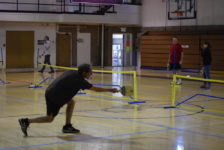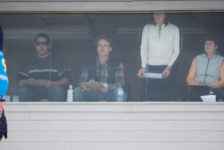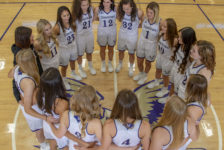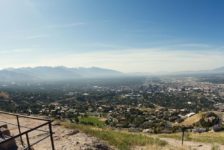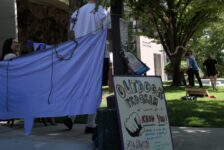
Mannequins of Olympic medal winners stand in the Alf Engen Ski Museum at the Utah Olympic Park in Park City, Utah. The park, which was part of the venue for the 2002 Winter Olympics, now serves as a training facility for Olympic hopefuls but may see competition again if Utah receives the 2026 Winter Olympic bid. (Photo by Berin Klawiter)
Officials in Utah and Colorado may bid to host the 2026 Winter Olympics, according to five anonymous sources as reported by the Associated Press — a proposal that has garnered mixed responses from the Westminster College community.
Colin Hinton, the president of the Utah Olympic Legacy Foundation, said in an interview with The Salt Lake Tribune that it stands “ready, willing and able when the time is right for the U.S. to host a Winter Olympics.”
When Utah hosted the winter games in 2002, the state saw a large economic benefit — spending $2.1 billion directly related to the Olympics and making $4.8 billion in sales and $1.5 billion in labor income, according to a report by the Center for Public Policy & Administration at the University of Utah.
Many of the venues created for the Olympics are still used as training facilities and some of the infrastructure upgrades made during that time still benefit Salt Lake City, such as the Utah Transit Authority’s TRAX system.
“The Olympics history is part of the reason the facilities are so nice here and that there are so many kids involved in athletics,” said Hannah Kearney, a former Olympian and current senior marketing major at Westminster.
But not all past Olympic sites see a lasting economic benefit from the contest.
“Are we positioned? Do we have the infrastructure? The answer to the question is yeah, we do, so it’s not a surprise we always come up in the conversation.” — Utah Sports Commission President Jeff Robbins in an interview with The Salt Lake Tribune
“There is quite a debate whether there are economic profits associated with hosting the Olympics,” said Richard Collins, an economics and finance professor at Westminster.
Utah isn’t alone in considering a bid; Austria, Switzerland and Canada have also expressed interest in hosting the 2026 Olympics. But Utah may have to overcome more obstacles to get picked, since the United States is also hosting the 2028 Summer Olympics in Los Angeles, California. No country has hosted back-to-back games since 1936.
“Unfortunately, it’s kinda political,” said Kearney, an American mogul skier who won a gold medal at the 2010 Winter Olympics and a bronze medal at the 2014 Winter Olympics. She currently serves on the International Ski Federation’s athlete’s commission.
Chris Hendrickson, the head ski coach at Westminster, lived in Salt Lake City during the 2002 Winter Olympics and said he is in support of the state hosting the competition again.
“I know it’s tough with the crowds, but we have the infrastructure here,” he said.
But some Utahns worry about extra traffic and added attention on the ski resorts if the state hosted the 2026 Olympics.
“As a local resident [during the 2002 Winter Olympics], I was not all that excited about having the Olympics here,” Collins said.
Although he wasn’t thrilled at first, he said he now thinks hosting the Olympics was a great economic opportunity and is in support of Utah hosting in 2026.
“I think it would put the spotlight on Utah as a winter resort area,” he said.
But many questions still need answers before the 2026 Winter Olympic host is determined.
“Are we positioned? Do we have the infrastructure? The answer to the question is yeah, we do, so it’s not a surprise we always come up in the conversation, just because there are very, very few places anywhere — if any — that have the infrastructures that are willing and able to host,” said Utah Sports Commission President Jeff Robbins in an interview with The Salt Lake Tribune. “I think it depends on our public officials and kind of what the appetite for the community would be to host it.”



